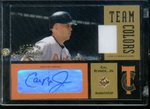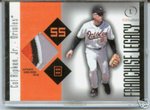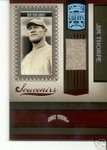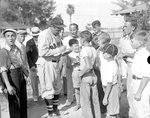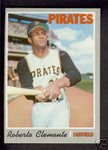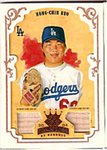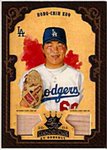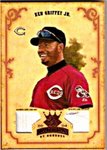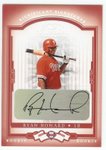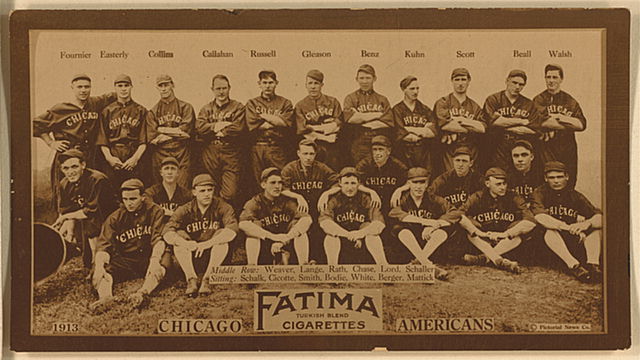Late July 2005, Donruss LP was informed by the Major League Baseball Players Association, usually printed MLBPA, that their license to make baseball cards would not be renewed in 2006. According to the MLBPA, the industry was just too cluttered with the myriad of products produced, that kids were no longer looking to baseball cards as their preferred hobby. They of course haven't stopped licensing video games, clothing, figures and toys, but apparently Donruss LP was the cause of all the "confusion". Yeah, kids have too many options at card shops and retail stores to decide which cards to collect, so they decide to not collect baseball cards? Give me a break! There are so many things taking up "free time" for children these days, that saying a lack of support in this market by children is because there are too many products out there is insane! Saying that Donruss LP is bad for MLB and the MLBPA is ridiculous! Oh Yeah, they didn't say that Donruss LP was bad, just didn't renew their license. Here is the actual statement:
"Although we are confident that the trading card category now will be most favorably positioned for future growth, the decision to move forward with only two licensees was not an easy one for us to make," said Judy Heeter, MLBPA Director of Business Affairs and Licensing. "We have enjoyed our personal and professional relationships with all the wonderful people at Donruss, we have the utmost respect for them and the venerable Donruss and Leaf brands, and we wish them all well."
Here are a few paragraphs from Beckett about it:
'Under the new agreements, baseball cards will be designed, marketed and promoted to attract kids and new consumers while still providing excitement and value to the current collector base. Promotional programs by licensors and manufacturers will have special appeal for baseball fans of all ages, and the presence of fewer products in the marketplace will reduce consumer confusion and clutter on retail shelves. In making the announcement, Evan Kaplan, MLBPA Director of Trading Cards and Collectibles, said, "Our licensees recognized the need to make improvements in every aspect of the trading card business. They are fully committed to building a wide spectrum of products that will meet the expectations of all fans."
With only two baseball trading card manufacturers, the new licensing landscape will focus on strong brand presence, longer shelf life and fewer, stronger products in the marketplace to simplify the retail experience for consumers. Emphasis on marketing, promotion and product development to attract new purchasers, especially kids, will bring renewed excitement to the category.'
Well, I have been collecting cards for 22 years. I started as a 14 year old kid, spending my lunch money and summer job money buying 1984 Fleer Baseball cards. They were on clearance at the Walgreens for $ .25 a cello pack! I bought so much that I filled an entire garbage bag! Not the best way to store them, but I didn't know anybody else that collected them and my parents thought it was all trash anyway, so it was perfect. I lost them all just 1 1/2 years later when my father threw them all away because we were moving across the country and he always hated them. In all of this time, I never felt confused as to what to buy when I was ready to buy more cards. If I like how they look, they feature players I collect and are within my budget, then I purchase them. If the cards were not up to my qualifiers, I never blamed the MLBPA, or MLB, I blame the manufacturer. Just like any other product offered to the public, if it is not liked and there are other options, the better product wins out. If a company can't sell what they make, they will change it or die out. What does the MLBPA know about making collectible cards and what the public, children in particular, wants? But, apparently, all of this survival of the fittest wasn't fast enough for the MLBPA. Or was it Topps and Upper Deck that put the "knife-in-the-back" of Donruss LP? Who wins with this decision?
"We couldn't be more enthusiastic about the prospect of a cleaner, more consumer-friendly retail environment", said Scott Silverstein, President of The Topps Company. "We believe this development will enable us to better serve our core customers and reach out to a broader base of new collectors with special emphasis on bringing back kids to the market."
“We are extremely pleased and proud to be given the opportunity to create a more comprehensive and robust marketplace to ensure the long-term preservation of our beloved hobby for future generations of baseball fans and enthusiasts,” said Richard McWilliam, Chairman and Founder of the Upper Deck Company.
Not either one of them was quoted saying that Donruss LP will be missed as a competitor. No recognition of how Donruss LP pushed them to do better or the innovations that were brought about by them. Instead, they just act as if Donruss LP never existed. Until competition entered the market, Topps never considered changing anything to their product other than the total print run of another cheap set to produce. Competition from several companies was what brought about the beautiful product we see in stores now!
Speaking of competition, they had just spent a lot of money signing exclusive deals with several of baseballs greatest players:
They bought one of Babe Ruth's rarest Home jerseys! Only 3 are known to exist, and this one was cut into swatches for cards. They spent a record setting amount of $264,911 to get it!
I am still not understanding who the people that were complaining are and why I or anyone else I have ever met, as a life long collector, was not asked what our opinion was to the "great problem" in today's market. If they were trying to make cards more available to a younger audience than what the average age of the current collector is, then why do it this way? The price of low end packs is about $1.00 per pack and these packs have a minuscule chance of getting the preferred memorabilia card in them. These cards are also, usually, the ugliest cards you have ever seen. The cards with more value to the manufacturer are also the most sought after by the collector. Basically, I think that MLBPA made a huge mistake, if their stated goals are actually what they are trying to achieve, Donruss LP was not the problem. Kids don't collect cards like they did in the past because they think baseball cards aren't cool, ok some do, they don't because of what is available to them now. Video games, you can play them anywhere now and they are a lot more fun, TV programs, Nascar collectibles, NFL collectibles, NBA collectibles, NHL collectibles, majorly bad press on steroid use in sports by the players and then lying about it (a hero doesn't lie), Pokemon, Movies and how about the major push in today's society for children to become adults much sooner than they should?!?!
I keep collecting based on the premise that my collection, kept in great condition, will be worth more than I have spent on it when I want or need to "cash it in" or pass it on to my family when the time is right. I collect from all of the manufacturers over the years and with Donruss LP out of the options, there isn't as much product for me to select from. Just the opposite of what the MLBPA said this would do. They can't seem to control the players at all, so I guess they are taking it out on the fans, by showing how much power they actually have. They have also shown me just how little they know of the baseball card industry. Limiting each company to only 20 sets per year, but not a limit on the actual total amount of product printed is a major blunder! Make MLB affordable again, both in tickets to the games, souvenirs, and other licensed products and you have a better chance to draw some youngsters into a very expensive hobby. Make baseball "cool" and all of the ephemera will follow suit! If you have lung cancer, cutting off the hand that you smoked with will not cure you! If you are dying on the inside, a face lift, liposuction and a tan will not make you live any longer! MLBPA, work on the issues that your clients and MLB have first and most of these other "issues" will be taken care of automatically!
GOODBYE DONRUSS LP! R.I.P.!!! THANK YOU FOR ALL THE GREAT CARDS AND MEMORIES!!! I HOPE AND PRAY THAT ONE DAY SOON YOU WILL BE ABLE TO RISE FROM THE ASHES AGAIN, LIKE THE PHOENIX YOU APPEAR TO BE, AND BRING BACK THE COLLECTING PUBLIC!!!

